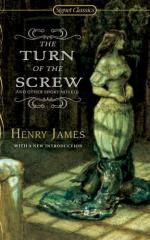|
This section contains 8,789 words (approx. 30 pages at 300 words per page) |

|
SOURCE: “Designed Horror: James's Vision of Evil in The Turn of the Screw,” in Nineteenth-Century Fiction, Vol. 39, No. 3, December, 1984, pp. 305–27.
In the following essay, Miall offers a reading of The Turn of the Screw based on Sigmund Freud's “The Uncanny.”
Henry James's tale of the supernatural has been the subject of intense critical attention ever since it was written. As all students of the story know, the presence of ghosts in it has presented a serious challenge to modern orthodoxy, but perhaps we are now less exercised by this aspect of the story. As a result, the narrative and aesthetic implications of the ghosts are not much considered. Explications of the story continue to appear with some frequency, but most of these are addressed to the status and assertions of the main narrator: for example, H. Robert Huntley's diagnosis of hysteria in the governess, Howard Faulkner's questioning of...
|
This section contains 8,789 words (approx. 30 pages at 300 words per page) |

|


